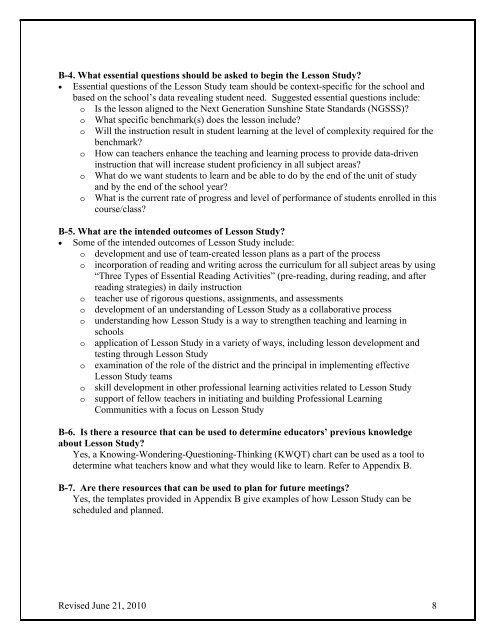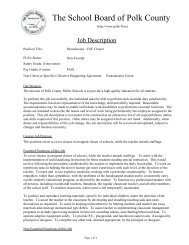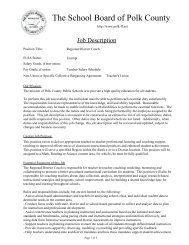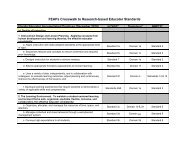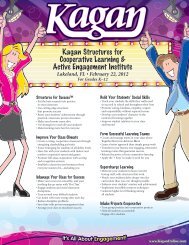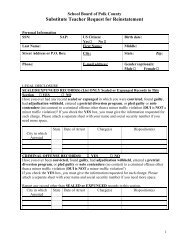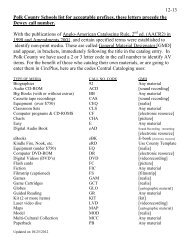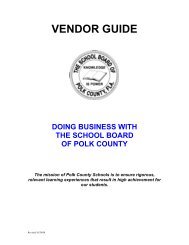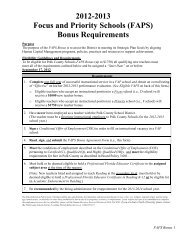FLDOE Lesson Study Guide - Polk County School District
FLDOE Lesson Study Guide - Polk County School District
FLDOE Lesson Study Guide - Polk County School District
Create successful ePaper yourself
Turn your PDF publications into a flip-book with our unique Google optimized e-Paper software.
B-4. What essential questions should be asked to begin the <strong>Lesson</strong> <strong>Study</strong>?<br />
• Essential questions of the <strong>Lesson</strong> <strong>Study</strong> team should be context-specific for the school and<br />
based on the school’s data revealing student need. Suggested essential questions include:<br />
o Is the lesson aligned to the Next Generation Sunshine State Standards (NGSSS)?<br />
o What specific benchmark(s) does the lesson include?<br />
o Will the instruction result in student learning at the level of complexity required for the<br />
benchmark?<br />
o How can teachers enhance the teaching and learning process to provide data-driven<br />
instruction that will increase student proficiency in all subject areas?<br />
o What do we want students to learn and be able to do by the end of the unit of study<br />
and by the end of the school year?<br />
o What is the current rate of progress and level of performance of students enrolled in this<br />
course/class?<br />
B-5. What are the intended outcomes of <strong>Lesson</strong> <strong>Study</strong>?<br />
• Some of the intended outcomes of <strong>Lesson</strong> <strong>Study</strong> include:<br />
o development and use of team-created lesson plans as a part of the process<br />
o incorporation of reading and writing across the curriculum for all subject areas by using<br />
“Three Types of Essential Reading Activities” (pre-reading, during reading, and after<br />
reading strategies) in daily instruction<br />
o teacher use of rigorous questions, assignments, and assessments<br />
o development of an understanding of <strong>Lesson</strong> <strong>Study</strong> as a collaborative process<br />
o understanding how <strong>Lesson</strong> <strong>Study</strong> is a way to strengthen teaching and learning in<br />
schools<br />
o application of <strong>Lesson</strong> <strong>Study</strong> in a variety of ways, including lesson development and<br />
testing through <strong>Lesson</strong> <strong>Study</strong><br />
o examination of the role of the district and the principal in implementing effective<br />
<strong>Lesson</strong> <strong>Study</strong> teams<br />
o skill development in other professional learning activities related to <strong>Lesson</strong> <strong>Study</strong><br />
o support of fellow teachers in initiating and building Professional Learning<br />
Communities with a focus on <strong>Lesson</strong> <strong>Study</strong><br />
B-6. Is there a resource that can be used to determine educators’ previous knowledge<br />
about <strong>Lesson</strong> <strong>Study</strong>?<br />
Yes, a Knowing-Wondering-Questioning-Thinking (KWQT) chart can be used as a tool to<br />
determine what teachers know and what they would like to learn. Refer to Appendix B.<br />
B-7. Are there resources that can be used to plan for future meetings?<br />
Yes, the templates provided in Appendix B give examples of how <strong>Lesson</strong> <strong>Study</strong> can be<br />
scheduled and planned.<br />
Revised June 21, 2010 8


